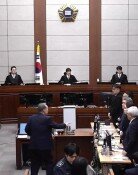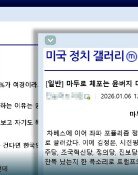Dubais Model of Economic Development
Dubais Model of Economic Development
Posted January. 07, 2008 07:53,
David Eldon, the sole foreign adviser on the presidential transition team, has mentioned the Dubai model several times in proposing policies to open the Korean economy and attracting foreign investment.
He said Friday that financial institutions doing business in the United Arab Emirates city pay almost no tax and has an independent regulatory authority, adding Koreas problem is that many regulations in the financial service sector overlap.
Eldon said that if Koreans want investment to come in, it has to come from within Korea. He added they have showed a willingness to do so by voting for Lee Myung-bak, whose campaign platform aimed at opening the economy.
Koreans should take seriously the move of oil money earned by Middle Eastern investors toward China, Eldon said, adding the Korean market needs to be as open as Dubais.
President-elect Lee at a Saturday meeting with Eldon asked his adviser to give a big help based on his past activities and experience in attracting foreign investment. The Scotsman answered that he is aware of investment-attracting procedures of other countries, and that he can lend a hand to Korea.
○ Dubais 4-Zero System
The Dubai model as described by experts can be summarized as the four zero system.
Foreigners can set up corporations with zero domestic partners; zero taxes; zero rules on sending money back home; and zero labor-management disputes.
SH Corp. President Choi Ryung, who was the director of Seoul project of the Seoul International Business Advisory Council in 2005 when it was chaired by Eldon, said, Eldon as council chairman emphasized that entry to and exit from financial business should be liberated through deregulation.
Dubai also prohibits labor-management disputes.
I heard that some Korean union members even flew to France to hold demonstrations against a French company, disregarding the fact that it was free of liability because it was a Korean subcontractor that went bankrupt, said Ahn Chung-yeong, an official of the Korea Trade-Investment Promotion Agency.
[The French firm] was not liable for the subcontractor, and [the union members] ruined the reputation of a country trying to attract foreign investment.
Eldon said that if Samsung or LG invests in other countries, but fails to transfer money back to Korea, they will hear no good words about them.
Dubai has also attracted 70 percent of Fortune 500 companies such as IBM and skilled workers by eliminating corporate and income taxes.
○ Making Choices that Suit Korea
Experts say Korea must also improve daily life for foreign residents in the country.
Dubai has attracted Harvard Medical International and Johns Hopkins Hospital from the U.S., built a sufficient number of international schools, and uses English in government and public offices, so foreigners can more easily live there, said Lee Yong-gu, a vice president of Sungwon Corporation.
Yet Eldon cited the need to develop a model unique to Korea, saying it is naive to believe that things that worked for other countries will do so for Korea.
Park Jae-ryong, head of research at Samsung Economic Research Institute, said, Considering that Dubai is ruled by a royal family, Korea will have to develop its own method of collecting opinions and choose what to learn and what not to from Dubais way of attracting foreign investment.
abc@donga.com ksch@donga.com



![[속보]윤석열 사형 구형…내란특검 “전두환보다 엄정히 단죄해야”](https://dimg.donga.com/c/138/175/90/1/wps/NEWS/IMAGE/2026/01/13/133151283.1.jpg)



